June 15, 2025 | 20:21 GMT +7
June 15, 2025 | 20:21 GMT +7
Hotline: 0913.378.918
June 15, 2025 | 20:21 GMT +7
Hotline: 0913.378.918
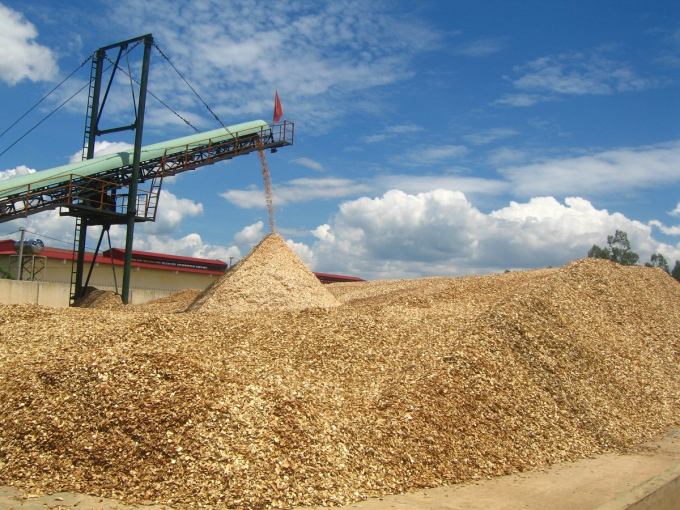
The price of wood chips exported to China currently reaches US$ 160 - 165 per ton, while in the same period in 2020 it was only US$ 126 per ton. Photo: V.D.T.
Two weeks ago, director of a wood chips processing company in Phu Tai Industrial Park (Quy Nhon city, Binh Dinh province) said the price was at peak level, purchasing from VND 1,600,000 to VND 1,650,000 per ton of fresh acacia.
Last week, director of another wood chips processing company in Quy Nhon city said that they were purchasing fresh acacia wood for VND 1,670,000 per ton. And he knows that there are some companies buying at VND 1, 7 million per ton.
The price of raw wood in Binh Dinh is at the highest ever. Moreover, the raw material wood is hot sale, that makes the purchase volume of companies specializing in the production of wood chips and pellets in Binh Dinh only about half of that in previous years.
According to Mr. Vo Van Toan, Director of Song Kon Co., Ltd., a company specializing in the production of wood chips in Phu Tai Industrial Park, the reason for the high price and scarce situation of plantation timber is because of increasing price of wood chips exported to China than in previous years.
“In the same period in 2020, the selling price of 1 ton of wood chips at Quy Nhon Port was only US$ 126 per ton, now it has increased to US$ 160 - 165 per ton. The output is being consumed very strongly, businesses processing wood chips in Binh Dinh has no source goods for sale,” said Mr. Vo Van Toan.
The increase in the export price of wood chips is because all services increase according to the world fuel price. Accordingly, the freight charges for shipping and transportation from the production sites to Quy Nhon Port, the wages of workers are also much higher than before.
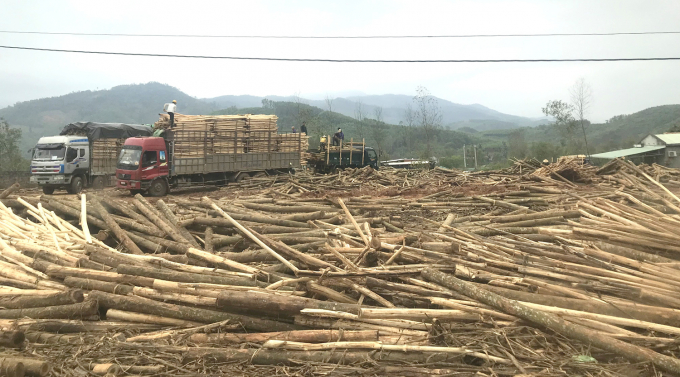
In the past, raw wood was purchased by factories with very strict specifications. Now, due to insufficient supply, they buy everything regardless of specifications to ensure production. Photo: V.D.T.
In addition, the demand for fuel in countries around the world is severely lacking due to the conflict's influence between Russia and Ukraine, so the demand for purchasing wood chips to process pellets has increased dramatically.
Besides, wood chips also serve the production of many other products. For example, China is a country that is developing a strong paper production industry. In recent years, each year China has to import about 12.5 million tons of wood chips, of which Vietnam accounts for 6 million tons. Or Japan, which imports about 10 million tons of wood chips every year, the country buys wood chips not for paper production like China, but for operating thermal power plants."
In Vietnam, the average annual export of wood chips brings in about US$1.5 billion, accounting for 15 - 17% of the country's total export turnover of wood products. Vietnam's annual export of wood chips is about 12 million tons, equivalent to 24 million m3 of input wood. The raw material for the production of wood chips is mainly planted forest wood.
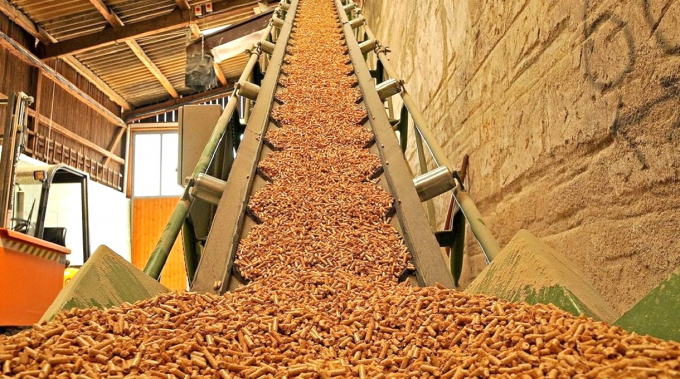
Raw wood is scarce, while the export market is strongly consuming wood chips and pellets, factories scramble to buy raw wood for production. Photo: V.D.T.
According to Binh Dinh Wood and Forest Products Association, there are 15 factories processing wood chips for export with a total capacity of over 1 million tons per year in Binh Dinh province.
So far, the output of this product has been mainly exported to the Chinese market, only a small volume is exported to the markets of Indonesia, Malaysia, Japan, and Korea.
In addition to wood chips processing factories, there are dozens of pellet processing factories in Binh Dinh. Pellet and wood chips are mostly produced from the input materials from planted forest wood.
Binh Dinh province currently has 128,510 hectares of planted forest wood, about 8,500 hectares are being exploited and replanted each year, with an output of 1 - 1.2 million tons of raw wood. In the context that wood chips and pellets are being exported strongly, processing factories have to compete to buy raw wood to maintain production.
In the past, factories purchasing raw wood applied very strict standards, such as acacia trees had to be peeled off, moisture had to be in the right order, old wood was bought but not young wood, wood had to have a diameter of 5cm or more...
Now, due to insufficient supply, factories buy all parts of tree and defy the regulations applied so far.
Raw wood is now also peeled, but not as clean as before, and still purchased by factories without any problems. In the past, if acacia trees with a diameter of less than 3cm would not be accepted by processing factories. They only accept trees with a diameter of 5cm or more. But now acacia with a diameter of less than 3cm purchased without any condition.
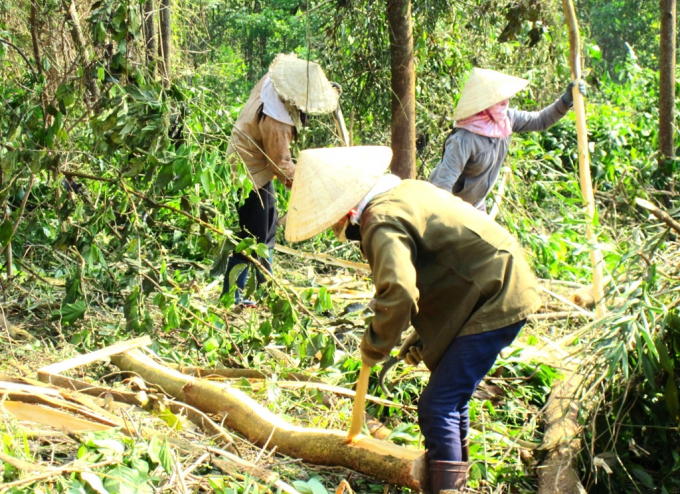
The labor fare for logging in planted forests is much higher than before. Photo: V.D.T.
“Wood materials are scarce now, if before, Song Kon Co., Ltd. bought about 700 tons of raw materials every day, now it can only buy 400 tons. From the beginning of the year until now, the company has exported to China about 50,000 tons of dry wood chips, although the selling price has increased, but due to the sharp increase in input wood prices, the company still has a profit of about US$ 3 - 4 per ton," said Mr. Vo Van Toan, Director of Song Kon Co., Ltd.
According to Mr. Cu Van Man, who currently has about 100 hectares of acacia forest at exploit-age in Phuoc Thanh commune (Tuy Phuoc district, Binh Dinh), although the price of planted timber is increasing and the purchasing power is strong, but the profit has not increased much compared to before due to the labor wages and transportation costs are also increasing rapidly along with fuel prices.
“Employees to exploit planted forests are now contracted. Depending on whether the forest is on a flat land or on a high mountain, easy or difficult to exploit, easy or hard to peel, forest growers have to pay for exploitation from VND 200,000 to 400,000 per ton.
It is the same for transportation costs, if the forest is located at a low location, within a distance of 20km from the factory, forest growers have to pay a transportation fee from VND 140,000 to VND 160,000 per square meter. If the distance is far from 40 - 50km and has to go uphill, the transportation fee will increase to VND 200,000 or up to VND 400,000 per square meter.
Therefore, although the price of raw wood is increasing, the profit of forest growers is still not much better than before," said Mr. Cu Van Man.
Translated by Duc Thuan

(VAN) Japan will release another 200,000 metric tons of rice from its emergency stockpile to tackle a doubling of prices since last year, Agriculture Minister Shinjiro Koizumi said on Tuesday.

(VAN) Coffee prices on June 13 declined sharply for Arabica. Domestic coffee market in Vietnam dropped by VND 2,000, trading at VND 111,500 – 112,300/kg.

(VAN) Coffee prices on June 12, 2025, continued to fall. Domestically, coffee prices decreased by another VND 2,000, trading at VND 111,500 – 112,300/kg.

(VAN) Coffee prices on June 11, 2025, fell sharply across global markets. Domestic coffee market dropped by VND 700, to the range of VND 113,500 – 114,300/kg.
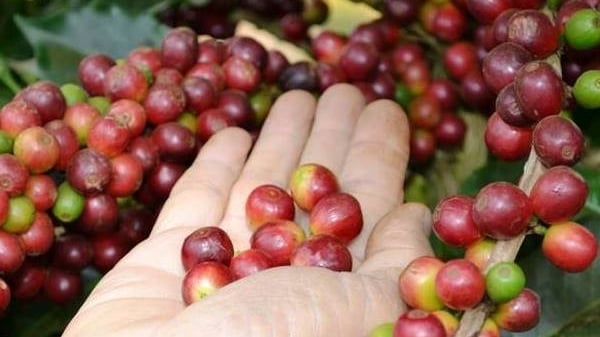
(VAN) Coffee prices on June 10 2025, rose sharply worldwide for Robusta. Domestic coffee market increased by VND 800, reaching VND 114,200 – 114,800/kg.
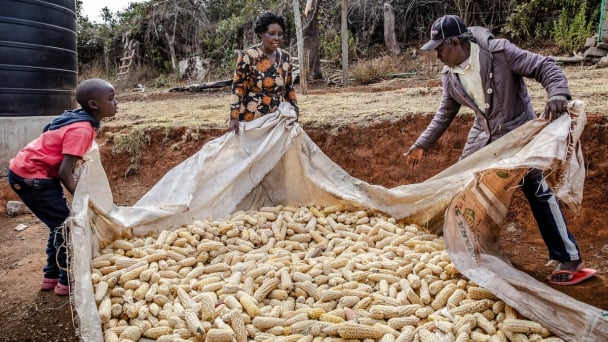
(VAN) New FAO forecasts point to record global cereal output with a partial rebound in stocks and trade.
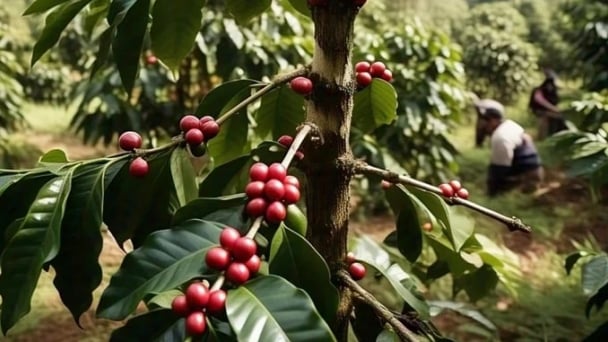
(VAN) Coffee prices on June 9, 2025, in domestic and global markets remain unchanged. Domestic coffee market is currently trading at VND 113,500 – 114,000/kg.